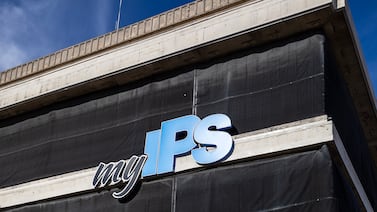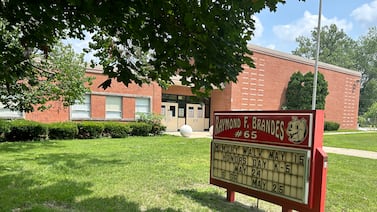Sign up for Chalkbeat Detroit’s free newsletter to keep up with the city’s public school system and Michigan education policy.
The Detroit school board on Tuesday night adopted a $1 billion spending plan for the next school year that maintains funding for programs at their current levels, extends an incentive program that pays students to attend high school, and invests in a new pilot program to provide yellow bus transportation for students at two high schools.
But there’s still some uncertainty about the budget approved for the Detroit Public Schools Community District. The Michigan Legislature has yet to approve a state budget that will outline how much per-pupil funding public schools will receive. And there are unknowns about federal funding.
Because of that, “we will then bring back a budget amendment in the fall,” Jeremy Vidito, the district’s chief finance officer, said during a budget hearing.
The budget assumes Gov. Gretchen Whitmer’s proposed 4.1% increase — $392 — in the per-pupil foundation allowance. The minimum amount a district can receive would increase to $10,000 per student. DPSCD receives the minimum.
The district’s $1.09 billion in expenditures is less than the current year’s amount of $1.12 billion. The decline is not related to cuts in programs, but instead due to a change in the state made in how it allocates pension funds to school districts.
Here are some of the budget priorities included in the adopted budget:
Budget focuses on literacy support for students
The budget includes $38 million from the state as part of the settlement of a literacy lawsuit. This is the second year that the settlement money, which totaled $94 million, is included in the budget. For the next school year, it will go toward a number of efforts, including hiring additional academic interventionists, hiring additional teachers to lower class sizes, and paying tutor stipends.
The settlement was from a historic lawsuit filed against the state on behalf of seven Detroit public school students who alleged that they were denied the opportunity to have a quality education because of poor building conditions, a shortage of textbooks and other learning materials, and poorly qualified teachers. It was filed during a period in which the state oversaw the district because of its massive debt.
A new pilot aims to improve attendance with bus transportation
The district is launching a new transportation pilot program aimed at reducing chronic absenteeism that will provide yellow school busing for students attending Henry Ford High School and East English Village @ Finney. High school students in the district currently must take city buses provided by the Detroit Department of Public Transportation to get to and from school. There are exceptions, including for some students with disabilities and students who are homeless. The pilot will mean students who live within the boundaries of the two schools can hop on yellow school buses for transportation.
“We want to see if yellow buses will improve student attendance vs. the current high school bus model,” Superintendent Nikolai Vitti told Chalkbeat in an email.
During the 2023-24 school year, 88% of the students at Henry Ford and 94% of the students at East English Village were considered chronically absent. A student is considered chronically absent in Michigan if they miss 10% or more of a school year. The district’s overall chronic absenteeism rate for that school year was 66%.
The district will continue attendance incentive that pays students
Another effort at improving attendance is an incentive program the district launched in January to pay students with $200 gift cards every two weeks if they have perfect attendance. Throughout the course of the incentive, which ran through March, students could earn a total of $1,000 in gift cards.
The program will be funded through the next school year.
Data showed that while many of the students who earned the gift cards were already consistent school attenders, the incentive did improve attendance and reduced chronic absenteeism.
It’s unclear how much the district has budgeted for both the attendance incentive or the bus pilot.
Lori Higgins is the bureau chief for Chalkbeat Detroit. You can reach her at lhiggins@chalkbeat.org.





